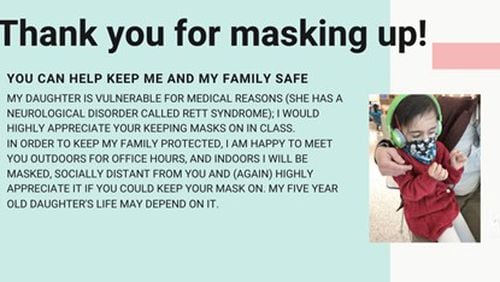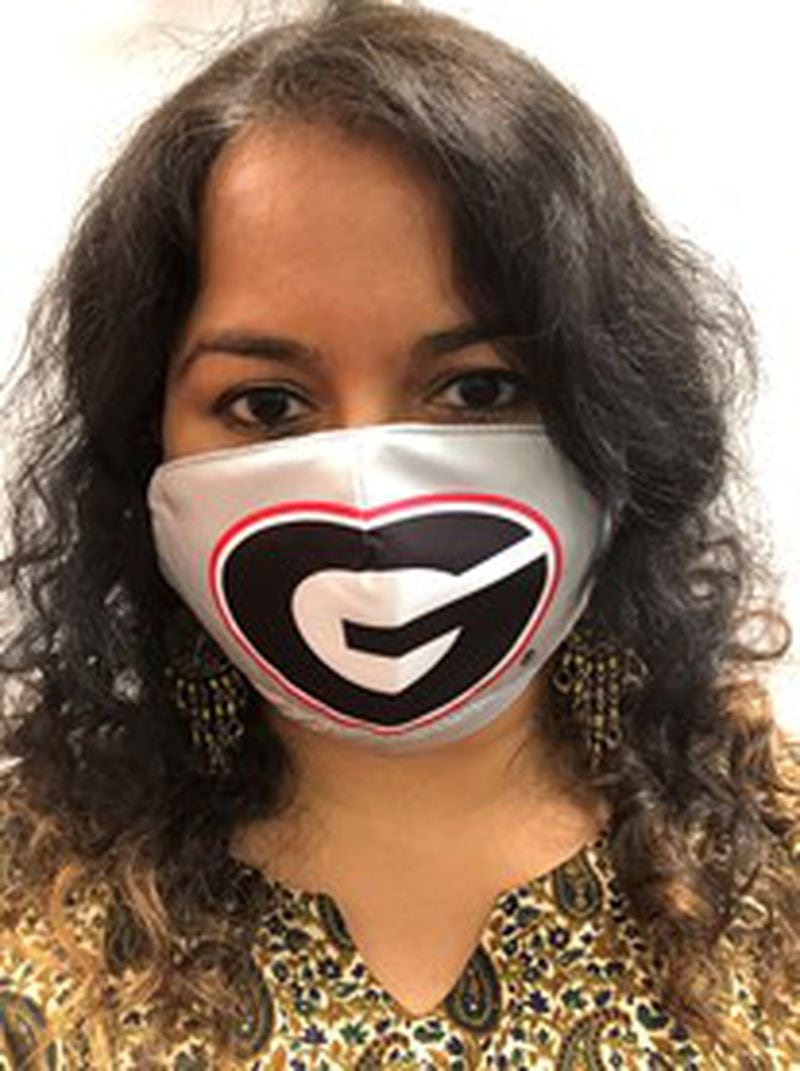Usree Bhattacharya is an associate professor of language and literacy education at the University of Georgia. In a guest column for this blog 11 months ago, Bhattacharya wrote about her little girl’s rare and catastrophic neurological disorder, which put the child at high risk for serious consequences or death if she contracted COVID-19. It was essential, wrote Bhattacharya, that she teach virtual classes to safeguard Kalika, who is now 5.
Now, UGA and other public campuses have summoned all their faculty back to campus with no masking required or vaccines, deferring to the political pandering of Gov. Brian Kemp rather than the medical recommendations of the Centers for Disease Control and Prevention. Many other campuses around the country require both masks and vaccinations. So do private colleges in Georgia.
Bhattacharya says teaching on the UGA campus with so many unmasked students increase chances she could bring the virus home to Kalika.
The UGA campus and downtown Athens are full of students without masks -- something I can vouch for as I now have three children living in Athens. That the mother of a child with a serious neurological disorder has to beg students at the University of Georgia to wear masks tells us some young people value their own petty concerns over human life and are too immature to be in college.
Of course, that these students are free to make this selfish decision is because the governor and the Board of Regents are exemplars of callous indifference to the safety and health of others.
By Usree Bhattacharya
At the end of a long workday, I felt the crushing weight of despair as I left Aderhold Hall, which houses the Mary Frances Early College of Education at the University of Georgia. For five years now, it has been my beloved professional home. I walked right past the sculpture of EduDawg, our dear MFECOE mascot, who now wears a cheerful, printed mask. My husband soon pulled into the parking lot, and I ran to the car. I couldn’t bring myself to say anything as I sat down inside.
For a long moment, I sat silently, my legs and hands trembling, tears streaming down my eyes. Alarmed, he asked me what was wrong. I could barely get the words out. It had hit me that my investment in my institution was not mutual: I love UGA in a way it will never love me back.
UGA has no mask or vaccine mandate. Given its policies, it is hard not to wonder if my institution cares whether I contract COVID-19 in the course of my professional duties. And, even more importantly, I feel that this “hands off” approach has left my 5-year-old unvaccinated daughter (who has a rare neurological disorder, Rett syndrome), profoundly vulnerable and at the mercy of vaccine and mask politics in our state system.
All that day, I had encountered unmasked people indoors on campus. I am profoundly lucky that I teach one online class and another small doctoral seminar where everyone is generally masked. Yet, I still have to share space everywhere I go on campus with people who do not wear masks. My masking up and being fully vaccinated protect me to an extent, but they do not make me invulnerable to other people’s decisions to disregard the CDC’s strong recommendations to do both (when medically possible) in our community, where the delta variant is spreading like wildfire.
It is highly unlikely that I will die from it, but I am capable of transmitting it to my daughter, who does not have that protection.
To be clear, this policy is not a “UGA policy” as much as it is handed down to us by the USG Board of Regents. The decision at that level is to merely encourage masking and vaccinations. This marked a relatively recent shift in our policy. We were all required to wear masks, which have been proven in study after study to help reduce transmission, for nearly a year on campus. The CDC has found that “individual benefit increases with increasing community mask use,” and that was the case this past academic year. Starting this Spring semester, vaccinations also commenced, and as a result the community spread became somewhat less of a terrifying concern.
A politically motivated maelstrom brewing over the past few months has brought an end to that. Masking in Georgia, and in other states, is now an inflammatory partisan and political issue, rather than one dictated by the strongest scientific research and recommendations. Why else, when we know that masking can help prevent the spread of COVID-19 among our students, faculty, and staff, would we decide to not ensure that our community has strict masking guidelines in place?
The delta variant is ravaging American communities, and we are impacted at a local, state, and national level. It is causing a “rapid and alarming rise in the COVID-19 case and hospitalization rates around the country” according to the CDC. Thus far, a million Georgians have contracted COVID-19; and if the state system continues to make masking optional, we are likely going to see many more people impacted.
This variant is not unknown to me; it hit very close to home. I ended up on national news crying about it (yes, really). My elderly parents, both of whom live in India (where the delta variant began), were infected with it. My mother had a mild case, but my father is still recovering, some five months later. They were both infected by someone not wearing a mask.
Geographically closer to home is my precious little girl. Since the start of the pandemic, my husband and I have done everything in our power to protect her. We kept her out of school for 14 months, until we felt it was safe to put her back when our school district took the wise decision to require masks for everyone. UGA, part of the same community, is calling on its community to do the “right thing.” I don’t understand why we then don’t just expect our community to do the “right thing” in all matters. Why is it negotiable when it comes to a matter of life and death?
In a recent piece, Dr. Amy Olberding, a professor of philosophy at the University of Oklahoma, described how a lot of us may be feeling right now going into classrooms: “We beg teenagers to think of our babies, to feel for our dead, and please not to kill us. Some of them oblige. Some do not — an alarming number do not. The university’s response so far amounts to: Beg better.”
I can empathize with this feeling. In my class last week, I put up a slide about my daugher and her risks from COVID. I don’t want to get COVID-19, and I don’t want to give it to my family. I don’t want it circulating without end within my community. If we continue politicking around this issue, our lives will be held captive by this disease forever. My daughter is already hostage to one disease; that is quite enough on our plate.
So here I am, begging of my students and the community around me: please put on a face mask if you can, for a few hours, indoors only, please, so you don’t infect me, members of my family, yourself, and others. I apologize for this very minor inconvenience. Let’s all choose life.
And yet, every time I step on my campus, I see people not doing the “right thing.” Those words of strong encouragement from our USG system…well, if mask use is any indication, then many people are simply not listening. I have heard from undergraduate, master’s and doctoral students; adjunct faculty; untenured faculty; and tenured faculty that they are encountering students in classes where there is no social distancing and little or no mask wearing.
We have no doubt that our community will pay heavily for this. UGA is my intellectual home, my “forever home” as a tenured faculty member, and it hurts to see my community reel in this manner. We can conquer this disease, but it requires accepting a little inconvenience.
These are minor sacrifices when compared to death and long-term disability. The choice should be simple: people’s lives over politics. In general, we trust people to do the “right thing,” but we also are a society of laws. This moment is revealing our flaws. It is time to reconsider the encouragement-only approach within the USG. It is up to the USG, now, to do the “right thing.”
About the Author








